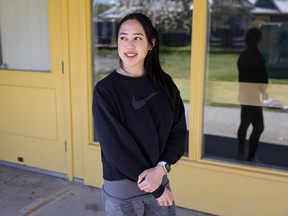The top destination for those likely to move was “somewhere else in the world,” followed closely by Alberta, according to a recent Leger survey. The reasons included the high cost of living and housing.

Article content
After a family friend moved from BC to Alberta, the thought of leaving Metro Vancouver became less daunting for Audrey Mak.
“Our mortgage is due for renewal in two years,” he said. “That was an ‘ah ha’ moment for me. Why don’t we look around us to see what is possible?
Article content
Now Mak and her husband are planning a summer trip to Calgary to look at houses.
The couple is part of a large group of British Columbians who are considering leaving Metro Vancouver as a way to get ahead of the high cost of living and housing.
Advertisement 2
Article content
A recent survey conducted by Leger for Postmedia found that 54 percent of Metro residents have thought about moving out of the region, and 24 percent are “very” or “somewhat” likely to do so within the next five years. .
The survey, which was conducted April 12-15, asked 500 adults a series of questions. The top destination for those likely to move was “somewhere else in the world,” followed closely by Alberta. Most cited the high cost of living and housing as a reason for leaving the country.
Leger executive vice-president Steve Mossop said he was surprised by the number of people who have considered moving, but admitted it could be a “fleeting thought”. More surprising, he said, is a quarter of people who said they were likely to move in the next five years.
People in the 55+ age group were the most likely to move, at 27 percent, compared to those in the 18-24 age group, at 20 percent.
Mossop said the financial barriers that make it difficult for people to live in Metro Vancouver can also make it difficult for them to leave. Older people often have the means to make a decision, while younger people may feel more “trapped.”
Article content
Advertisement 3
Article content
Still, it’s unclear how many people will actually move, Mossop said, particularly given the amount of effort required to find a new job and a new home. “I’m not sure this will really translate into a significant number of people leaving.”
The survey matches a clear theme in Leger’s recent survey of people across the country. More and more Canadians feel a level of “discontent” that Mossop has not seen in its 35 years of conducting surveys.
“Food prices, inflation, frustration with the government and disillusionment with society” may be influencing people’s thoughts about where they live and where things could improve, he said.
For Mak, that’s starting to sound like Alberta.
She grew up in Vancouver and purchased a pre-sale townhouse in 2018. In 2020, she and her husband moved to New Westminster in search of more space. But even with two well-paying jobs, the couple feels like they work just to pay the bills.
“We don’t have the financial freedom to travel and do the things we would like to do,” he said.
With one child and plans to have more, Mak said her husband always wanted a single-family home. But as interest rates and housing prices have risen, they are considering a one- or two-hour drive to Vancouver from the eastern Fraser Valley.
Advertisement 4
Article content
The looming refinancing, plus stories of a family friend who moved to Alberta and paid off his mortgage, have made Calgary an attractive option.
“I don’t want to move,” Mak said. “But I want to do what’s best for my family.”
In Kelowna, Stacy Rodriguez and her husband are also considering a change. They grew up in Vancouver before buying a house in Langley. In 2017, they realized they could upsize to a house by moving to the Interior.
As the couple approaches retirement, they have been talking about how to navigate the lifestyle they want.
“We’ve lived in a condo before and we’d like to stay in a house,” he said.
Rodriguez estimates they can save about $100,000 by moving to Alberta, a considerable savings that will allow them to travel.
“Cost of living, food, car insurance, housing… everything, on average, costs more in British Columbia,” he said. The couple plans to move “as soon as we stop working.”
Edmonton-area real estate agent Adrienne Carlton said she has received multiple calls from British Columbians interested in moving. A home inspector recently told her that about half of her recent jobs come from people who moved from out of province.
Advertisement 5
Article content
“People say they want a future for their children,” said Carlton, who works for eXp Realty. “They are worried that their children won’t be able to afford a house with the high cost of living.”
Niall Jones, owner of Ouch My Back Moving in Victoria, said 70 to 75 per cent of the inquiries he receives come from British Columbians moving to Alberta, and only 25 per cent go the other way. . When he talks to clients, he gets the sense that while BC is “outwardly nice,” he lacks a sense of community and care.
“To put it bluntly, I think people are tired of this. The cost of food, bad housing. People are tired of holding their breath and wondering if they are going to make it,” she said.
Recommended by Editorial
-

Nothing lasts forever, including my East Vancouver neighborhood. Here are the memories.
-

Federal budget housing initiatives steal a page from BC Premier David Eby
-

Douglas Todd: Record population growth a ‘huge problem’ for housing in BC
Article content



